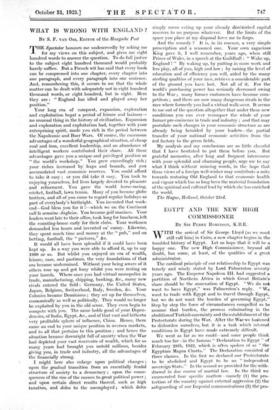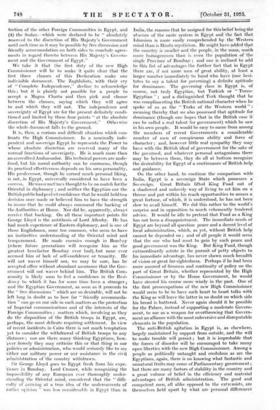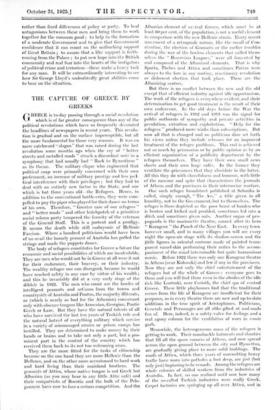EGYPT AND THE NEW HIGH COMMISSIONER
BY SIR PERRY ROBINSON, K.B.E.
WITH the arrival of Sir George Lloyd (as we must still call him) in Cairo, a new chapter begins in the troubled history of Egypt. Let us hope that it will be a happy one. The new High Commissioner, beyond all doubt, has some, at least, of the qualities of a great administrator.
The cardinal principle of our relationship to Egypt was tersely and wisely stated by Lord Palmerston seventy years ago. The Emperor Napoleon III. had suggested a partition of Northern Africa in which Great Britain's share should be the annexation of Egypt. " We do not want to have Egypt," was Pahnerston's reply. " We want to trade with Egypt and to travel through Egypt, but we do not want the burden of governing Egypt." Step by step the force of circumstances compelled us to assume that burden, the process culminating in the abolition of Turkish suzerainty and the establishment of the Protectorate during the War. After the War we hastened to disburden ourselves, but it is a task which internal conditions in Egypt have made extremely difficult.
We went as far as we could—and some people think much too far—in the famous " Declaration to Egypt " of February 28th, 1922, which is often spoken of as " the Egyptian Magna Charta." The Declaration consisted of three clauses. In the first we declared our Protectorate to be abolished and Egypt to be an " independent sovereign State." In the second we provided for the with- drawal in due course of martial law. In the third we enumerated four specific matters—namely (1) the pro- tection of the country against external aggression (2) the safeguarding of our Imperial communications (8) the pro- tection of the other Foreign Communities in Egypt, and (4) the Sudan—which were declared to be " absolutely reserved to the discretion of His Majesty's Government untilsuchtiMe as it may be possible by free discussion and friendly accommodation on. both sides to conclude agree- ments in regard thereto between His Majesty's Govern- ment and the Government of Egypt."
We take it that the first duty of the new High the first will be to make it quite clear that -the first three clauses of this Declaration make one indivisible document. The Zaghlulists," with their cry of " Complete Independence," decline to acknowledge this ; but it is plainly not possible for a people to accept a Magna Charta and then pick and choose between the clauses, saying which they will agree to and which they will not. The independence and sovereignty of Egypt are for the present definitely condi- tioned and limited by these four points " at the absolute discretion of His Majesty's Government." Otherwise the whole document falls to the ground.
It is, then, a curious and difficult situation which con- fronts the High Commissioner. In a nominally inde- pendent and sovereign Egypt he represents the Power to whose absolute discretion are reserved many of the normal functions of sovereignty. He is much more than an accredited Ambassador. His technical powers are unde- fined, but his moral authority can be enormous, though • its practical effectiveness depends on his own personality. His predecessor, though he earned much personal liking, is not, in Egypt, universally considered to have been a success. He was sc met:111es thought to be no match for the Oriental in diplomacy ; and neither the Egyptian nor the British public had perfect confidence that he would hold to a decision once made or believed him to have the strength to insure that he could always command the backing of the Authorities at Home. Nor did he, apparently, always receive that backing. On all these important points Sir George Lloyd is the antithesis of Lord Allenby. He has had much experience of Eastern diplomacy, and is one of those Englishmen, none too common, who seem to have an instinctive understanding of the Oriental mind and temperament. He made enemies enough in Bombay (where future generations will recognize him as the greatest benefactor Bombay ever had), but none ever accused him of lack of self-confidence or tenacity. He will not waver himself nor, we may be sure, has he accepted office without abundant assurance that the Gov- ernment will not waver behind him. The British Com- munity is likely soon to feel a confidence in the Resi- dency to which it has for some time been a stranger ; ' and the Egyptian Government, as soon as it proceeds to the " free discussions " which are so desirable, will not be left long in doubt as to how far " friendly accommoda- tion " can go on our side in such matters as the protection of Imperial communications and of the interests of the Foreign Communities ; matters which, involving as they do the disposition of the British troop in Egypt, are, perhaps, the most delicate requiring settlement. In view of recent incidents in Cairo there is not much temptation yet to consider the withdrawal of British troops to any :distance-; nor are there many thinking Egyptians; how- eVer:ftercely they may criticize this or that thing in our ;policies or administration, who, would seriously like to see -either our military power or our assistance in the civil administration of the country withdrawn.
Sir George. Lloyd goes to - Egypt fresh from his expe- rience in Bombay. -Lord Cromer, while recognizing The impossibility of any European ever thoroughly under- standing the Oriental mind, considered that the " diffi- culty of arriving at a true idea of the undercurrents of native opinion "' was less considerable in Egypt than in _India, the reasons that he assigned for this-belief being the absence of the caste system in Egypt and-the fad that Islamism is more easily comprehended :by.: the -_ mind than is Hindu mysticism: He might. have added-that the country:is smaller and-the people; in the Maas, much more hoMOgeneous than - is even the popUlation of the . single Province of Bonibay ; and one is inclined to add- . to this list of advantages the further fact that in Egypt there are if not More" men of great ability, at least a larger number immediately to hand. who haVe (one hek-: tates to say a talent. for governing) a definite aptitude for dominance. -The governing class in Egypt is, of course, not truly Egyptian, but Turkish or " Turco-. - Egyptian ." ; and a distinguished Turk .thought that he was complimenting the British national character when he spoke of us as the " Turks of the Western world " : meaning thereby that we also possessed that aptitude for dominance (though one-hopes that in the British case-it can be called a real talent for government) which he saw in his own people. It would be easy to name from among the members of recent Governments a considerable; number of men of conspicuous ability and force or character ; and, however little real sympathy they may have with the British ideal of government for the sake of the governed, and whatever personal antagonisms there' may be between them, they do all at bottom recognize the desirability for Egypt of a continuance of British help!
and guidance. .
On the other hand, to continue the comparison with India, Egypt is a sovereign State which possesses a' Sovereign. Great Britain lifted King Fuad out of a shadowed and unlovely way of living to set him on a' throne and put within his reach opportunities to amass a great fortune, of which,' it is understood, he has not been' slow to avail himself. We did this rather to the world's surprise and in opposition to much vehemently tendered. advice. It would be idle to pretend that Fuad as a King. has not been a disappointment: The immediate needs of Egypt are beyond all question peace and a decent level of local administration, which, as yet, without British help i cannot be depended on ; and of all people it would seem that the one who had most to gain by such peace and good government was the King. But King Fuad, though extraordinarily astute in the pursuit of petty objects to his immediate advantage, has never shown much breadth' of vision or great fai-sightedness. Perhaps if he had been' more assured of firmness and continuity of policy on the part of Great Britain, whether represented by the High Commissioner or by the Home Government, he would' haVe steered his course more wisely in the past. One of the first preoccupations of the new High Commissioner, -would 'seem to be to have such heart to heart talks with' the King as will leave the latter in no doubt on which side his bread is buttered. Never again should it be possible for the Palace, instead of supporting a moderate Govern-.: ment, to use as a weapon for overthrowing that Govern- rnent an alliance with the most subversive and disreputable, elements in the population.
The anti-British agitation in Egypt is, as elsewhere, .largely maintained by support from outside, and the will to make trouble will persist ; but it is improbable that the forces of disorder will be encouraged. to take many open liberties with the new High Commissioner. Among-a people as politically untaught and 'credulous as are the .Egyptians-, again,_ there is no knoWing what fantastic and unnatural fruits may come of Parliamentary government ; but there are many factors of stability in the country and a great volume of belief in the efficiency and material advantages of British administration. The good and competent men, all alike opposed to the extremists, are themselves held apart by what are personal differences rather than fixed differences of policy or party. To heal antagonisms between these men and bring them to work together for the common good ; to help to the formation of a moderate Government and to give that Government confidence that it can count on the unflinching support of Great Britain ; to assure that a like support is forth- coming from the Palace ; to put new hope into the British community and real fear into the hearts of the instigators of political crime and terrorism—these make a heavy task for any man. It will be extraordinarily interesting to see how Sir George Lloyd's undoubtedly great abilities come to bear on the situation.
































































 Previous page
Previous page